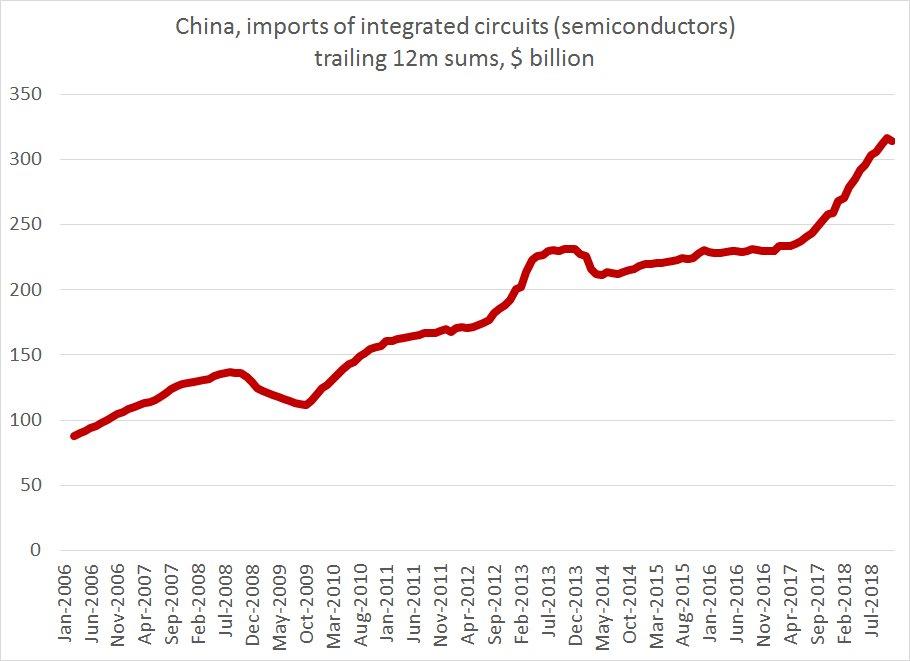“Nothing Like This Has Happened Before”: China To Invest $1 Trillion In New Plan To Overtake US In Tech
Tyler Durden
Wed, 05/20/2020 – 20:51
As we have been writing since late 2018, when it comes to the technological arms race between the US and China, one place where China has been badly lagging the US, is in the production of semiconductors, which is also China’s biggest weakness in its ongoing scramble to catch up with the US technologically.
China’s media agrees: over the weekend, we quoted from a Global Times op-ed according to which “although the US had experienced a large-scale deindustrialization in the second half of the 20th century, it still maintains advantages in the semiconductor sector with companies such as Intel, which could complete the whole process of the chip design to producing. The country has held on to cutting-edge semiconductor manufacturing techniques over the past decade.”
And now that the cold war between the US and China is about as formal as it can get, China has decided it can no longer rely on the US for being its primary source of high-end technology, and according to Bloomberg, Beijing is accelerating its bid for global leadership in key technologies, and will pump more than a trillion dollars into the economy “through the rollout of everything from wireless networks to artificial intelligence.”
Purposefully invoking the spirit of “Made in China 2025”, a plan that has in the past infuriated the White House, China’s strategic “masterplan” is backed by President Xi Jinping himself, and will see China invest an estimated $1.4 trillion over six years to 2025, “calling on urban governments and private tech giants like Huawei Technologies to lay fifth generation wireless networks, install cameras and sensors, and develop AI software that will underpin autonomous driving to automated factories and mass surveillance.”
This also means that while pursuing China’s plans to reinvent its technological base and to restructure its entire semiconductor supply chain, Beijing will also create the supreme police state dystopia, one which is even more powerful than the current iteration.
Predictably, the new infrastructure initiative is expected to rely on local giants from Alibaba and Huawei to SenseTime Group while shunning U.S. companies. And as Bloomberg adds, “as tech nationalism mounts, the investment drive will reduce China’s dependence on foreign technology, echoing objectives set forth previously in the Made in China 2025 program. Such initiatives have already drawn fierce criticism from the Trump administration, resulting in moves to block the rise of Chinese tech companies such as Huawei.”
“Nothing like this has happened before, this is China’s gambit to win the global tech race,” said Digital China Holdings Chief Operating Officer Maria Kwok, as she sat in a Hong Kong office surrounded by facial recognition cameras and sensors.
“Starting this year, we are really beginning to see the money flow through.”
Maria Kwok’s company is a government-backed systems integration provider, among many that are jumping at the chance. In the southern city of Guangzhou, Digital China is bringing half a million units of project housing online, including a complex three quarters the size of Central Park. To find a home, a user just has to log on to an app, scan their face and verify their identity. Leases can be signed digitally via smartphone and the renting authority is automatically flagged if a tenant’s payment is late.
The tech investment push is part of a broader fiscal package waiting to be signed off by China’s legislature, which convenes this week. The government is expected to announce infrastructure funding of as much as $563 billion this year, against the backdrop of the country’s worst economic performance since the Mao era. It will also include an expansion in the PLA’s budget to contain the “growing threat of US conflict“, as we discussed last night.
As Vital Knowledge points out in a note on Wednesday afternoon, “depending on how Beijing frames its tech ambitions around the NPC, this $1T+ blueprint could draw the ire of the White House and spur further measures aimed at inhibiting Chinese IT firms (recall the White House pushed hard for China to drop its prior “Made in China 2025” tech plan).”
via ZeroHedge News https://ift.tt/2zUlhXG Tyler Durden
